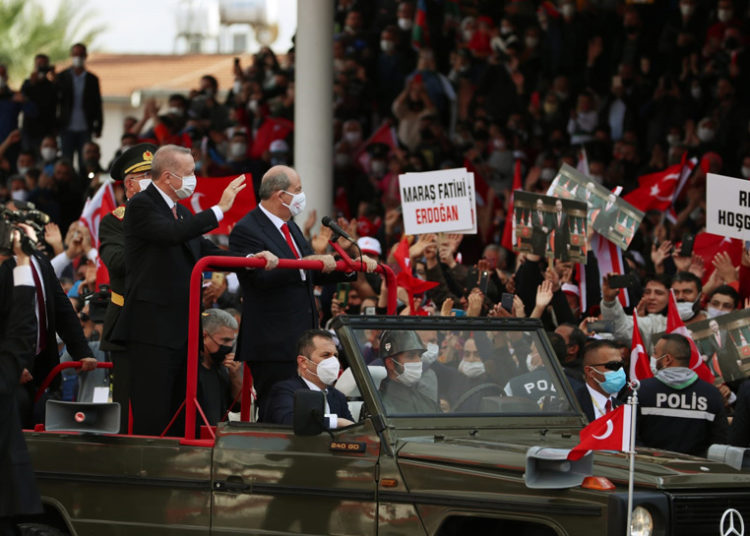Levent Kenez/Stockholm
Turkey this week promised a $500 million line of credit to the Turkish Republic of Northern Cyprus (KKTC), a breakaway state recognized only by Turkey. According to the credit agreement obtained by Nordic Monitor, Turkey is to lend money to the KKTC in Turkish lira (TL), while it will receive repayment in dollars, a difficult condition for Turkish Cypriots given the ongoing depreciation of the lira against the US dollar.
According to the agreement approved by Turkish President Recep Tayyip Erdoğan on Tuesday, the Turkish Treasury will provide Turkish Cypriots with credit up to the Turkish lira equivalent of $500 million. The reason for the line of credit is stated as the restructuring of the public and financial sector of the KKTC. The $500 million will be disbursed in tranches, and repayments, which will start 36 months after the loan’s approval, will be made every six months in 14 installments, ending in 114 months. The amount to be repaid will be determined by converting the Turkish lira transferred from the Turkish Treasury to the KKTC into dollars at the official exchange rate of the Turkish Central Bank that day. The KKTC is required to make interest payments according to the six-month US dollar LIBOR (London Interbank Offered Rate) published by Reuters.
The text of the credit agreement only in Turkish, very simple compared to similar agreements:
Although the Turkish government claims the credit will be allocated to infrastructure and health expenditures, it is estimated that the KKTC, whose economy is completely dependent on Turkey, will spend it on financial expenditures including paying salaries. Turkish Cypriots, whose most important income is generated from tourism, can host very few foreign tourists due to international isolation and the embargoes imposed after Turkey invaded the northern part of the island in 1974 in retaliation for a coup carried out by Greek nationalists.
It is yet not known how much of the promised line of credit Turkey will be able to extend. Turkey is experiencing difficult economic times and announced strict austerity measures this month. Nordic Monitor previously reported that the Turkish government aims to reduce its foreign operations expenditures.

Erdoğan’s official visit to the KKTC in November 2020 gives a clue as to where Turkey’s funds could be spent. During the trip Erdoğan recommended that a presidential palace be built in Cyprus, where some 330,000 Turks live, saying Turkey could undertake the construction of a presidential complex on a 5,000-square-meter plot of land.
“Such buildings, as you know, change other countries’ perceptions,” Erdoğan said, implying his desire that the KKTC be accepted as a sovereign state. The Turkish government has started pushing a two-state solution for divided Cyprus as part of what observers believe is a trump card against an anti-Turkey coalition in the eastern Mediterranean and a preemptive diplomatic maneuver to pressure the European Union ahead of possible sanctions from the bloc.
Isolated in the region, Erdoğan and his far-right allies have turned to alternative diplomatic moves in order to break the anti-Turkey siege and convince stakeholders to bargain with Turkey. By insisting on a two-state solution in Cyprus, which will increase tensions there, Ankara is aiming to create a new front in the regional dispute and force the bloc to deal on a range of matters including energy resources in the eastern Mediterranean.
However, some Turkish Cypriots oppose these Turkish policies. It is no secret that Turkey interfered in the 2020 presidential election in the KKTC in order to curb the influence of people who oppose it, with Turkish government operatives threatening candidates running against the Turkish-backed then-Prime Minister Ersin Tatar, the Raporluyoruz Group, a team of civil society representatives, lawyers and researchers, revealed.
Tatar, a nationalist backed by Ankara, supports closer ties with Turkey and advocates a two-state solution on the island. He won the election with 51.69 percent of the vote, ousting the incumbent Mustafa Akıncı, a left-wing politician who wanted to resume peace talks with Cyprus’s internationally recognized Greek government.
Akıncı told the Raporluyoruz Group that a team from Turkey’s National Intelligence Organization (MİT) directed the election campaign on behalf of Tatar. His aide said he was invited to meet with high-ranking MİT officials.
“I urge you to convey to Akıncı that it will be best for him, his family, and his close colleagues to withdraw his candidacy,” the MİT agents told him during the meeting.
In the run-up to the election, the Turkish ambassador to the KKTC invited a number of deputies to his residence to garner support for Tatar. Tatar also paid two unexpected visits to Ankara in the week leading up to the election, where he was promised cash injections to the Turkish Cypriot economy.
Akıncı and Ankara have been at odds over the solution of the Cyprus problem since reunification talks collapsed in July 2017. Their relationship deteriorated further in 2020 when Akıncı, in response to a question by British newspaper The Guardian on the possibility of Turkey’s annexation of the north of the island, said, “It’s a horrible scenario.”












